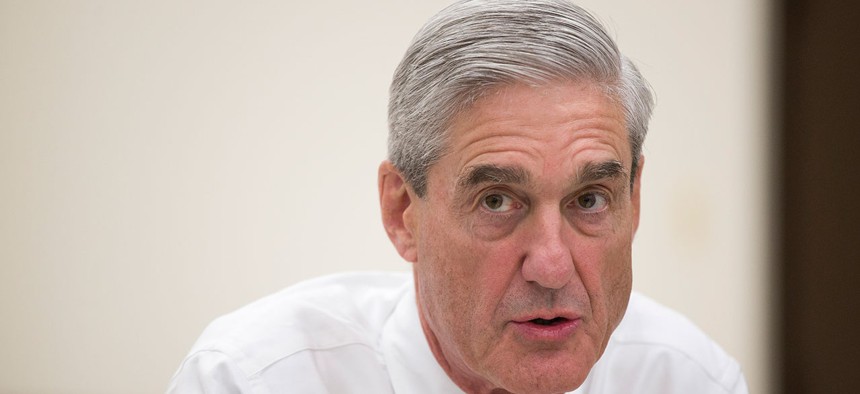Mueller Pick Meets a Rare Bipartisan Consensus
Democrats and Republicans each had reasons to praise the appointment of the former FBI director to lead the investigation into the Trump campaign’s ties to Russia.
At a moment of peak political polarization, the Justice Department’s appointment of Robert Mueller to serve as special counsel leading its Russia investigation achieved a rare consensus: Nary a whiff of criticism from either party greeted the announcement on Wednesday night.
Democrats got what they had long demanded: An apolitical and eminently credible prosecutor with no connection to President Trump who will lead an investigation that now has at least a measure of independence within the Trump administration. Mueller, 72, was the longest-serving FBI director since J. Edgar Hoover; originally an appointee of President George W. Bush in 2001, he agreed to serve an additional two years past his 10-year term at the request of President Barack Obama.
“Former Director Mueller is exactly the right kind of individual for this job,” Senate Minority Leader Charles Schumer said in a statement. “I now have significantly greater confidence that the investigation will follow the facts wherever they lead.”
House Minority Leader Nancy Pelosi offered a similar endorsement, calling Mueller “a respected public servant of the highest integrity.” Other Democrats followed suit, thanking the deputy attorney general, Rod Rosenstein, for answering their increasingly urgent calls for a special prosecutor following Trump’s firing of FBI Director James Comey and Tuesday’s report by The New York Times that the president sought to quash the bureau’s investigation into his former national security advisor, Michael Flynn.
Even the American Civil Liberties Union applauded the selection of Mueller, while noting that it sued the FBI several times under his leadership.
Republicans joined in the parade of praise for Mueller, undoubtedly relieved that Rosenstein’s decision would lift at least part of Trump’s political burden from their shoulders. GOP lawmakers have been hounded by reporters in recent days seeking their reactions to the latest bombshell media reports, and Mueller’s appointment allows them to defer to an investigation that now has bipartisan credibility. Representative Jason Chaffetz of Utah, chairman of the House Oversight Committee, called Mueller “a great selection” with “impeccable credentials.” Senator Charles Grassley of Iowa, chairman of the Judiciary Committee, said the former FBI chief “has a strong reputation for independence, and comes with the right credentials for this job.” Senator Cory Gardner of Colorado said Mueller had “an incredible reputation.” “It’s the right decision,” he said Thursday morning at an event hosted by The Atlantic. “Let’s get the facts, let’s get the information, and let us proceed with all haste.”
Trump, too, was unusually restrained in his response. “As I have stated many times, a thorough investigation will confirm what we already know—there was no collusion between my campaign and any foreign entity,” the president said in a written statement. “I look forward to this matter concluding quickly.”
House Speaker Paul Ryan and Senate Majority Leader Mitch McConnell each signaled their support for Rosenstein’s decision while vowing that the separate congressional investigations would continue. Upcoming testimony by Comey and other officials will certainly capture headlines and sway public opinion, but Republicans will face less pressure on Capitol Hill as long as Mueller’s probe maintains credibility.
As for Trump, the president faces the same risk he did before: criminal prosecutions that could imperil his presidency and perhaps lead to his impeachment. But the potential reward is greater, too. Exoneration by an impartial investigator who has won bipartisan buy-in would do far more to lift the cloud hovering over the White House than the result of any GOP-led probe in Congress.
To the extent the Justice Department’s announcement generated any criticism, it came from House Democrats who have called not only for a special counsel but for the creation of a fully independent, bipartisan commission modeled on the panel that investigated the 9/11 attacks.
“A special prosecutor is the first step, but it cannot be the last,” Pelosi added in her statement. “Director Mueller will still be in the chain of command under the Trump-appointed leadership of the Justice Department. He cannot take the place of a truly independent, outside commission that is completely free from the Trump administration’s meddling.”
A truly independent commission, however, would take an act of Congress, and Republicans in control of both the House and Senate now have less of an incentive to support such a panel with the appointment of a special counsel. And Democrats in the Senate have been hesitant to call for a new outside committee, knowing that it would take months to staff up and its probe could drag on for years.
For the moment, the one thing both parties seem to agree on is that Robert Mueller is the next best thing.
NEXT STORY: Should the Government Guarantee Everyone a Job?



